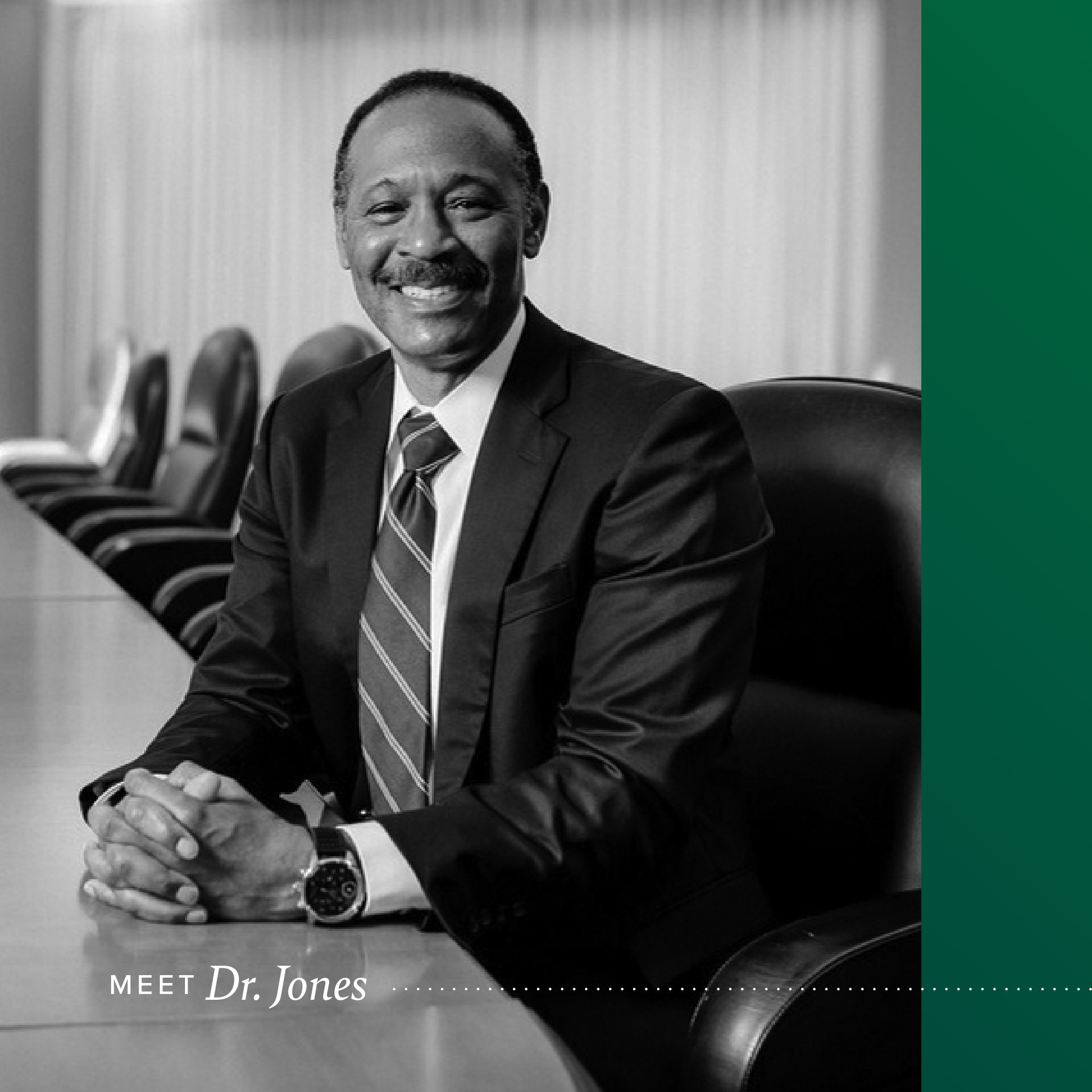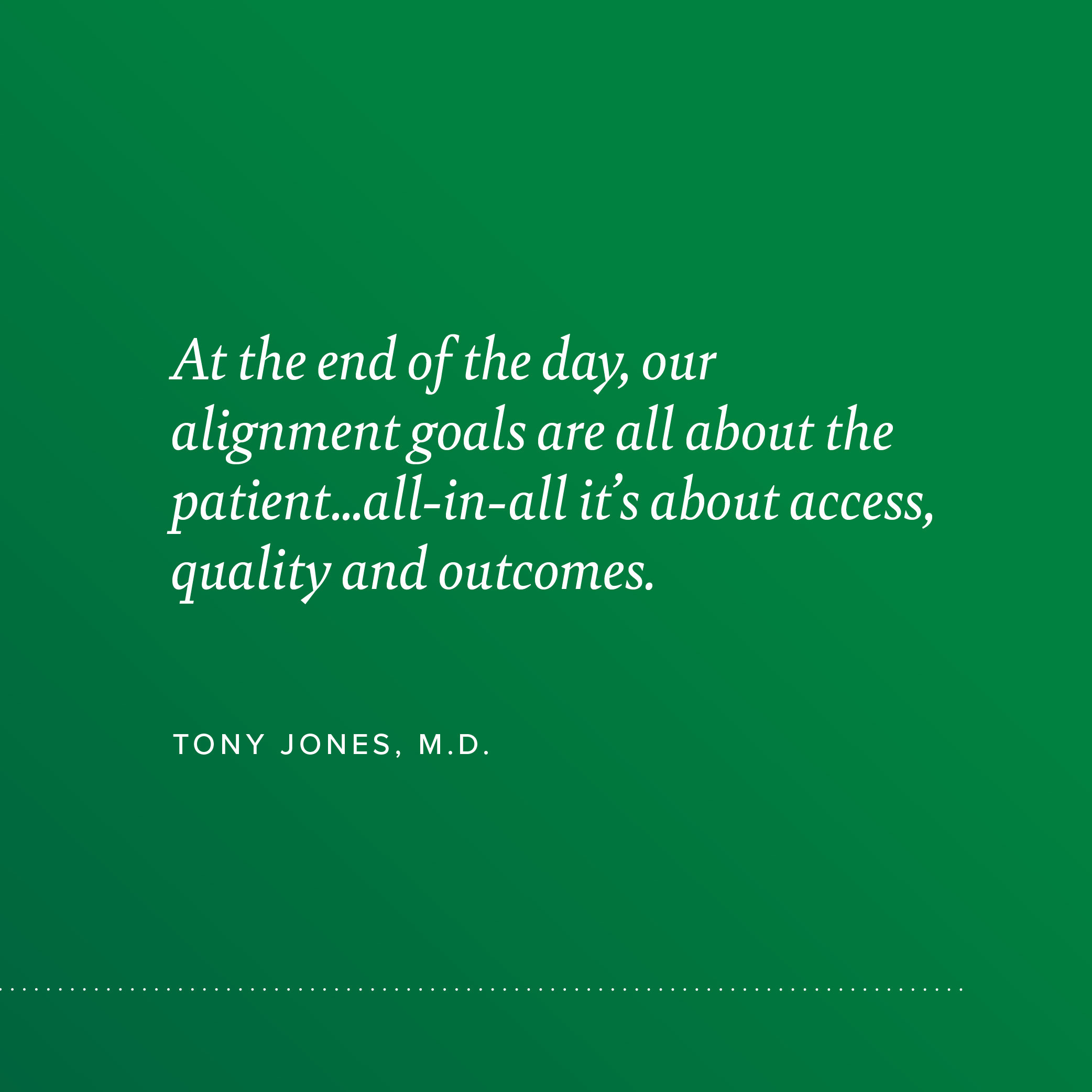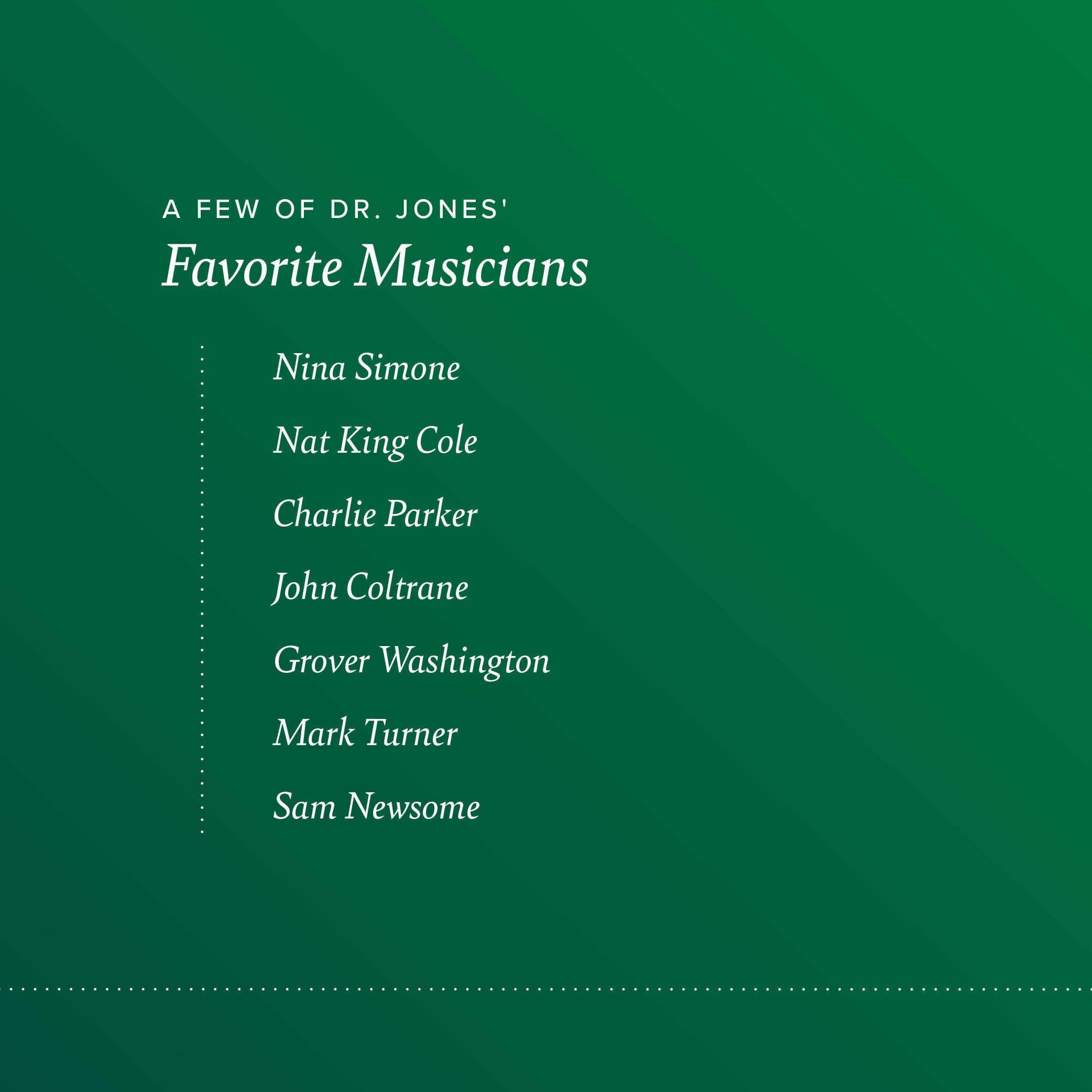 In the "Meet medicine leadership" series, leaders across the health system share their stories and their vision for UAB as we shift to a new chapter. Across the organization, key leaders are critical to supporting Selwyn M. Vickers, M.D., FACS, as he transitions to his role as dean of the Heersink School of Medicine, CEO of UAB Health System and CEO of the UAB/Ascension St. Vincent’s Alliance.
In the "Meet medicine leadership" series, leaders across the health system share their stories and their vision for UAB as we shift to a new chapter. Across the organization, key leaders are critical to supporting Selwyn M. Vickers, M.D., FACS, as he transitions to his role as dean of the Heersink School of Medicine, CEO of UAB Health System and CEO of the UAB/Ascension St. Vincent’s Alliance.
This week, the communications team sat down with Tony Jones, M.D., to talk about his background as a UAB medical school alumni, shaping the first role of UA Health Services Foundation president, and his key priorities as the UAB Health System moves forward.
Since 2006, Tony Jones, M.D., president of the UA Health Services Foundation, chief physician executive of the UAB Health System and senior associate dean for Clinical Affairs in the Heersink School of Medicine, has served in leadership positions across UAB.
Now, with Vickers’ transition to the dual Dean and CEO role, Jones will assume additional leadership opportunities with provider alignment in the UAB/Ascension St. Vincent’s Alliance.
“Right now, what I am most excited about working with other leaders to influence access of patients in Birmingham to excellence in patient experience and,” Jones said. As a UAB medical school alumni and long-time researcher and physician, Jones knows the ins and outs of our three mission areas first hand.
The road to academic medicine
Born to parents in the U.S. military, Jones spent his childhood living in Europe around the country. When his parents divorced, Jones’ mother opted to stay at their current station—Fort McLellan—located in Anniston, Alabama. Jones spent his adolescence there before leaving home to attend the University of Alabama for his undergraduate degree.
After, Jones went to medical school at, what is now, the UAB Heersink School of Medicine, graduating in 1986. He planned to go into private practice as a physician, but when he started his residency at the Mayo Clinic in Rochester, Minnesota, he became exposed to "the much broader world of academic medicine."
“I didn’t plan to have a career in leadership,” he said. “But residency programs at the Mayo Clinic help trainees identify their strengths, then support them as they clarify their goals throughout training. I was exposed to academic medicine’s broader impact on patient care during that time.”
Jones said academic medicine has a more universal and wider influence on the future of medicine than day-to-day physician activity. This trait compelled him to stay at the Mayo Clinic as he began his career.
“I stayed at the Mayo Clinic until I was recruited to UAB to chair the Department of Anesthesiology and Perioperative Medicine in 2006,” he recalled.
After his time as chair, Jones became president of UA Health Services Foundation, chief physician executive of the UAB Health System, and senior associate dean of Clinical Affairs in the Heersink School of Medicine.
He said it took time to develop a central vision for his roles. "It took time to find the beacon—the light to which all activities in the role steer towards,” he said.
 Focusing on the calling, not the job
Focusing on the calling, not the job
Jones, who enjoys jazz music and studying history, accredits his success to mentorship early on and throughout his career. “Mentorship has been invaluable to me. I was successful in my research career because of mentorship, training, and a whole lot of elbow grease,” he said.
He explained the value of mentorship is witnessing what it means to have a calling in a career. To Jones, a "calling" goes beyond the job duties, promotions, and other "external trappings" and centers on the importance of having a passion for the work itself. "My mentors not only talked about a calling but lived it."
“Having a calling is pursuing excellence for the sake of excellence. That is an approach that I have taken and still take, even today,” he said.
In the same way, Jones said it is easy and seamless to be a leader at UAB because his colleagues approach their work as a calling.
The next chapter
A passion point of Jones’ is identifying where institutional friction—barriers to excellent patient care—exist, then facilitating new, accessible routes. For example, one of his key priorities within the new leadership model is to work on physician alignment that supports patient care and patient access within the UAB/Ascension St. Vincent's Alliance.
"Dr. Vickers will lead us to identify our barriers in aligning patient care, and I'll have a heavy hand in creating aligned incentives. The goal is to connect the dots. All in all, it’s about access, quality and outcomes,” he said.
Jones will serve as UAB’s physician leader representative on many Alliance committees, while Tim Bode, M.D., will represent Ascension St. Vincent’s. Bode, the chief clinical officer of Ascension Alabama, brings over 20 years of medical leadership experience to the table.
Jones and Bode both know Alabama’s patient population well and will pave the direction for excellent patient care. “At the end of the day, our alignment goals are all about the patient,” said Jones.
Inside UAB Medicine, Jones is excited to continue working on a significant initiative creating internal access in ways UAB has not yet done. “We’re on year two of probably four in this project,” he explained. “The goal is to create a cultural change with how we create highly functioning physician and Advanced Practice Provider teams. Our practice plan has over 750 APPs, and we've made major changes to embed more positions in a care team to our plan."
Staying well by having fun
Outside of work, Jones stays well by engaging in activities he enjoys. Jones and his wife, Evelyn, who retired from her role as executive director of Diversity and Community Affairs at Heersink last year, take their extended family on vacations. "I like to invest in people and experiences, not things," he said.
In the same way, Jones enjoys jazz music and is a trained saxophonist. "When I retire, I think I'll learn soprano saxophone," he said. Too, his son plays the piano, and one of Jones' favorite past times is when they play music together.
He also mentions his love for history, military history specifically. “Studying leadership of military history is fascinating," he said. "I try to understand tactics and strategy of military history. Studying the tactics, especially, are key as a leader. Strategy is important—you have to know where you’re going—but tactics of ‘how’ are necessary to get there. I like the adaptive capability of problem-solving in real-time,” he said.
Jones explains that studying history in this way helps him, as a leader, to understand that problem solving cannot be viewed as monocular, but instead should consider all the circumstances and confounding factors around the issue.
A team mentality
Jones approaches the future by leading other leaders as he always has: with a team mentality.
“What led me to where I am today was the realization during my training years of how much I enjoy working in teams—with people—my chairman, colleagues, and departmental leaders at the Mayo Clinic,” he said.
The desire to work in teams has followed Jones throughout his career. When he became president of HSF, his main goal was to evolving the mindset of key leaders, chairs, and executive administrators. The shift he aimed to create was about working in teams, together—and having leaders think about the “whole” instead of operating in silos.
"When I took on the HSF presidency role full-time, one question I asked the chairs is 'Are we excellent in all that we do? And if not, how do we become excellent?' At first, they said yes, but as we dug deeper, we found more ways than expected to improve on our excellence.”
While he has seen tremendous change and likely because of it, his approach remains the same. Jones looks forward to impacting the Alliance, internal UAB care teams, and several dynamics that come with the CEO and Dean leadership model change.